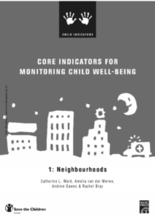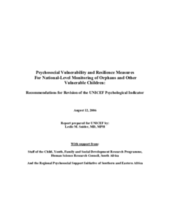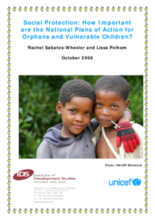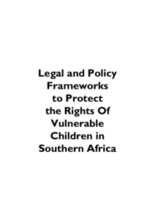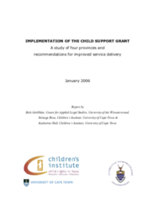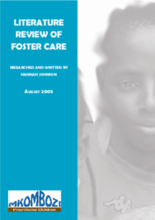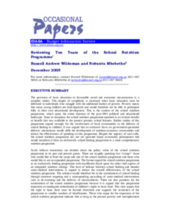childrens_living_arrangement
children_living_without_bio
Displaying 291 - 300 of 312
A series of 14 Core Indicator Sets that can be used by stakeholders to monitor the situation of children in South Africa.
A study of the management, operations, and care offered by institutions for AIDS orphans in South Africa. It compares the findings of registered and unregistered institutions.
"According to the first stage of our research, there is no significant difference between children, based on their orphan status," Quinlan said. Orphaned children are doing as well in school and engaging in the same level of risk behavior as their non-orphaned counterparts.
This document discusses the work contributing to the area of psychosocial measurement with regard to HIV/AIDS and provides samples of surveys that can be used in measurement.
This briefing paper emerges from a review of 14 national plans of action (NPA), or in the absence of a NPA, outputs from the rapid assessment analysis and action planning (RAAAP) work for orphans and children made vulnerable by HIV/AIDS. The purpose is to analyse the way that issues of social protection are incorporated into these plans and to highlight areas within the plans where social protection activity may be needed to achieve stated outcomes. Annex 3 summarises, country by country, the social protection content of each NPA.
Reviews legal and policy frameworks for the protection of OVC rights in 10 Southern African countries. Includes key concerns and recommendations. Appendix includes country-specific details of National Policies on Orphans and Vulnerable Children and National Plans of Action.
Identifies strengths and weaknesses of services offered to OVC in South Africa. A detailed list of recommendations suggests improvements to services.
Using fieldwork data from six sites, this report addresses the need for improved delivery of the Child Support Grant in South Africa. Includes a comprehensive review of the grant components and current system of delivery. Recommended changes to the act and regulations are highlighted.
A brief overview of foster care practice in the UK, Australia, South Africa, Uganda, and Tanzania. It includes information and lessons learnt on how caregivers are recruited and trained in these countries, how a child is placed, and how family support services are offered.
Reviews the history, effectiveness, and efficacy of the School Nutrition Programme in South Africa. Conclusions strengthen arguments for programme expansion.

